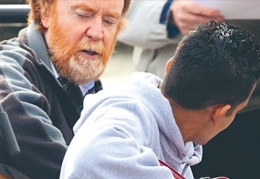Fergus McCabe of Neighbourhood Youth Project 2 tell Michaela Dwyer about the work his initiative has done for Dublin’s inner city youth, integration and beyond
At Summerhill Parade in north inner-city Dublin, just before Clarke’s Bridge over the Royal Canal, stands the unassuming façade of the Bridgewater Hall apartment building. But step inside and you will see walls painted with large, colorful murals. Further in, a kitchen and common room buzz with the activity of teenagers speaking in different accents, challenging each other in table football. Welcome to Neighbourhood Youth Project 2 (NYP2), which first opened its doors to Irish and international inner-city youth in 1979.
NYP2 has long been a bastion of youth-focused cultural integration in north Dublin. Co-founded by community social worker Fergus McCabe, the project operates according to a philosophy of youth empowerment in giving back to and sustaining local communities.
“The whole idea is to enable young people with various issues to try and deal with them by helping the youth to stay in the community,” said McCabe recently. “The notion is one of restorative justice – working with people to enable them to make a contribution and give back.”
In the early years of the program, NYP2 catered mostly to native Irish, the majority of whom were adolescent boys. However, McCabe emphasised that one of the greatest strengths of the programme has been its determination to evolve and accommodate the increasing migrant and immigrant populations living in Dublin.
“In the last 10 years, we made a deliberate decision. We knew that the demographic nature of the [north inner-city Dublin] area had changed,” said McCabe. “It was not traditional Irish anymore, but also asylum seekers, unaccompanied children, kids here illegally, kids who felt alienated… The big challenge was to move from being a totally Irish ethnic group to becoming international.”
By shifting the focus of the project to a more “open-door”, holistically accepting policy, McCabe and his fellow volunteers pioneered a new integration model that grew organically from interactions between Irish and non-Irish youth – and counters the sort of ‘engineered integration’ that proliferates in the sector.
“It hasn’t been so easy, and sometimes there’s a lot of resistance,” said McCabe. “But it’s been more positive than we expected.”
NYP2’s typical programming features cultural and athletic activities, including residential retreats to areas outside of Dublin. It also assists in disseminating information about education, the health system and immigration policy to the communities it serves. To further these issues, NYP2 facilitated the offshoot initiative YPAR (Young People at Risk) to advocate on a policy level.
The project has also recently aligned itself with Impact trade union’s Joe Lucey Small Grants Fund. McCabe serves on the board of the fund, which recognises local intercultural and educational initiatives.
If NYP2’s current level of involvement is any indication of its future affairs, it looks set to continue to pioneer in the field of integrated community development. It already partners with other youth-directed programmes such as the Swan Youth Centre and seeks to make more of such connections in the future. The economic downturn, said McCabe, has largely contributed to the organisation’s impetus to be more creative and efficient.
“Now the economy has forced us to look at what’s important,” said McCabe. “In this way there are difficulties, but there are also great possibilities. We want to stay true to our aspiration of treating kids equally.”












